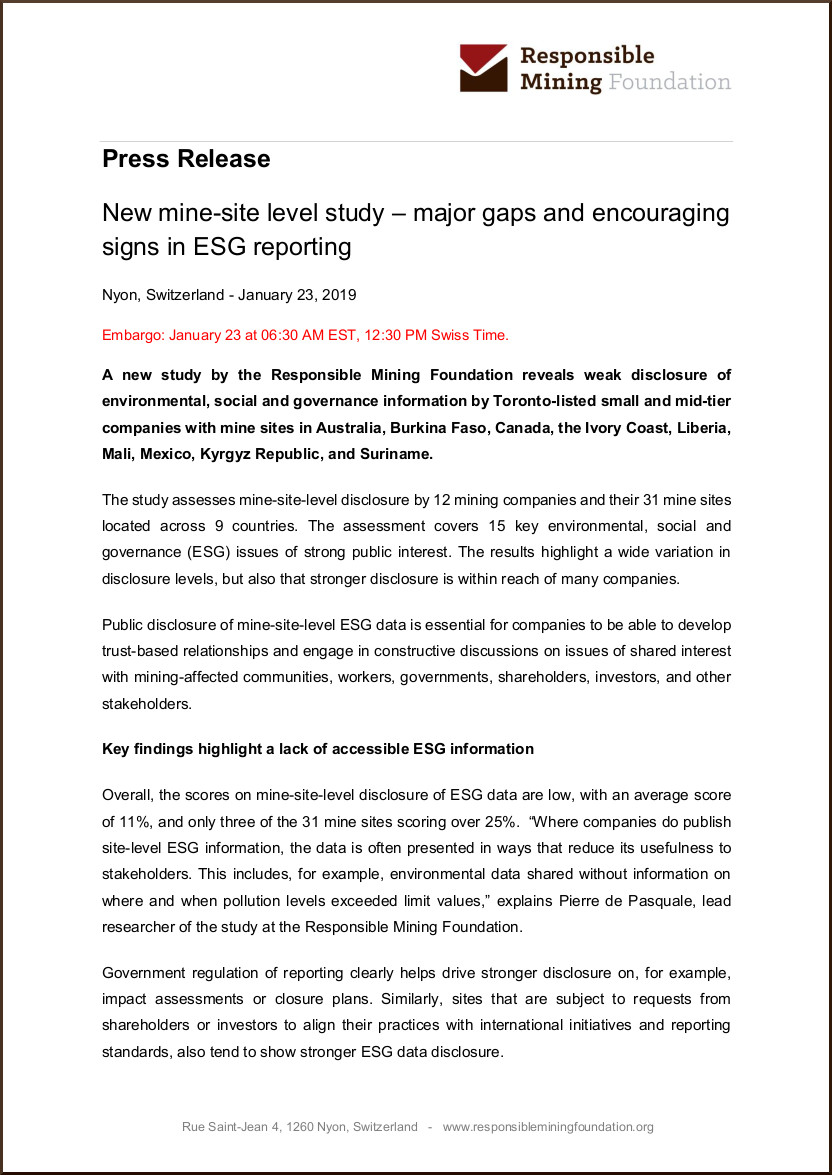Mine-site Study Published

|
Download the press release (pdf) ➥ English ➥ Français |
Mine-site level study – major gaps and encouraging signs in ESG reporting
A new study by the Responsible Mining Foundation reveals weak disclosure of environmental, social and governance information by Toronto-listed small and mid-tier companies with mine sites in Australia, Burkina Faso, Canada, the Ivory Coast, Liberia, Mali, Mexico, Kyrgyz Republic, and Suriname.
The study assesses mine-site-level disclosure by 12 mining companies and their 31 mine sites located across 9 countries. The assessment covers 15 key environmental, social and governance (ESG) issues of strong public interest. The results highlight a wide variation in disclosure levels, but also that stronger disclosure is within reach of many companies.
Public disclosure of mine-site-level ESG data is essential for companies to be able to develop trust-based relationships and engage in constructive discussions on issues of shared interest with mining-affected communities, workers, governments, shareholders, investors, and other stakeholders.
Key findings highlight a lack of accessible ESG information
Overall, the scores on mine-site-level disclosure of ESG data are low, with an average score of 11%, and only three of the 31 mine sites scoring over 25%.

Where companies do publish site-level ESG information, the data is often presented in ways that reduce its usefulness to stakeholders. This includes, for example, environmental data shared without information on where and when pollution levels exceeded limit values
Government regulation of reporting clearly helps drive stronger disclosure on, for example, impact assessments or closure plans. Similarly, sites that are subject to requests from shareholders or investors to align their practices with international initiatives and reporting standards, also tend to show stronger ESG data disclosure.
It is worth noting that the Toronto Stock Exchange and TSX Venture Exchange, with the largest number of listed mining companies in the world, do not have any requirements in terms of ESG data disclosure by mining companies beyond the standard Canadian regulations, though it does provide non-binding recommendations.
The weakest results of the study relate to working conditions. Many of the companies referenced are not able to demonstrate that they ensure the provision of appropriate safety equipment for all workers, or that they have effective grievance mechanisms in place for their workforce.
The best-performing site of the assessment is in Burkina Faso, which is neither the largest in terms of the size of its workforce, nor the value or volume of its production. The study also highlights encouraging examples of leading practice in systematic engagement with mining-affected communities on the results of environmental impact assessments, and on the testing of emergency response plans.
Stronger ESG information disclosure achievable for many companies
The mine-site-level ESG information disclosure varies widely among the companies. A few of the companies in the study already collect and collate some site-level data, as shown by their publication of aggregated company-level data. Stronger disclosure of ESG data is clearly achievable for many small and mid-tier companies, and without much additional effort.

Mining companies themselves stand to gain from strengthening their ability to ‘know and show’ how they are addressing these issues of public interest
Responsible Mining Foundation
The Responsible Mining Foundation (RMF) is an independent research organisation that encourages continuous improvement in in responsible mining across the industry by developing tools and frameworks, sharing public-interest data and enabling informed and constructive engagement between mining companies and other stakeholders.
As an independent foundation, RMF does not accept funding or other contributions from the minerals and metals industry.